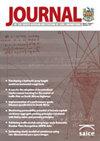作为辅助胶结材料的地方污水污泥灰的评估——焚烧温度和灰冷却速率的影响
IF 0.6
4区 工程技术
Q4 ENGINEERING, CIVIL
Journal of the South African Institution of Civil Engineering
Pub Date : 2022-03-25
DOI:10.17159/2309-8775/2022/v64no1a4
引用次数: 1
摘要
本文报道了污水污泥灰作为硅酸盐水泥的火山灰辅助胶凝材料的可能用途。污水污泥样品在700°C、800°C和900°C下焚烧,然后在熔炉(FISA)、空气(AISSA)或水中淬火冷却。将所得灰研磨至合适的细度,并用于制备水泥浆和砂浆,其中粘结剂由30%的灰和70%的硅酸盐水泥组成。糊状物样品用于水化产物演变的微观和化学评估,而砂浆用于评估灰对实验室制备的样品的工作性和抗压强度的影响,水/粘合剂比为0.5。以粉煤灰为参考火山灰材料,对污泥灰的性能进行了评价。对污水污泥灰的分析表明,存在胶结化合物和水化产物,这表明这种材料可以用作波特兰水泥的部分替代品。然而,污水污泥灰降低了砂浆的可加工性。抗压强度结果表明,当污水污泥在900°C下焚烧,然后在水中淬火时,强度最高。本文章由计算机程序翻译,如有差异,请以英文原文为准。
Assessment of local sewage sludge ash as a supplementary cementitious material - effects of incineration temperature and cooling rate of the ash
This paper reports on the possible use of sewage sludge ash as a pozzolanic supplementary cementitious material to Portland cement. Samples of sewage sludge were incinerated at 700°C, 800°C and 900°C and these were then cooled in the furnace (FISSA), in air (AISSA) or by quenching in water. The resulting ashes were ground to suitable fineness and used to prepare cement pastes and mortars in which the binder consisted of 30% ash and 70% Portland cement. The paste samples were used for microscopic and chemical assessment of the evolution of hydration products, while the mortars were used to assess the effects of the ashes on workability and compressive strength of laboratory-prepared samples using a water/binder ratio of 0.5. Fly ash was used as a reference pozzolanic material to assess the performance of sewage sludge ashes. Analysis of the sewage sludge ashes showed the presence of cementitious compounds and hydration products that suggest that this material can be used as a partial replacement of Portland cement. However, sewage sludge ash reduces the workability of the mortar. Compressive strength results indicate that the highest strength is obtained when the sewage sludge is incinerated at 900°C and then quenched in water.
求助全文
通过发布文献求助,成功后即可免费获取论文全文。
去求助
来源期刊
CiteScore
0.70
自引率
25.00%
发文量
19
审稿时长
>12 weeks
期刊介绍:
The Journal of the South African Institution of Civil Engineering publishes peer reviewed papers on all aspects of Civil Engineering relevant to Africa. It is an open access, ISI accredited journal, providing authoritative information not only on current developments, but also – through its back issues – giving access to data on established practices and the construction of existing infrastructure. It is published quarterly and is controlled by a Journal Editorial Panel.
The forerunner of the South African Institution of Civil Engineering was established in 1903 as a learned society aiming to develop technology and to share knowledge for the development of the day. The minutes of the proceedings of the then Cape Society of Civil Engineers mainly contained technical papers presented at the Society''s meetings. Since then, and throughout its long history, during which time it has undergone several name changes, the organisation has continued to publish technical papers in its monthly publication (magazine), until 1993 when it created a separate journal for the publication of technical papers.

 求助内容:
求助内容: 应助结果提醒方式:
应助结果提醒方式:


